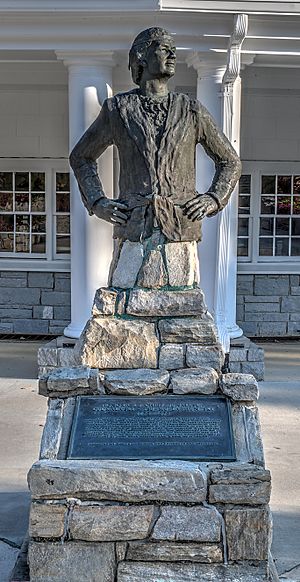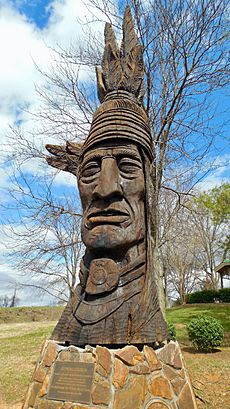Junaluska facts for kids
Quick facts for kids
Junaluska
|
|
|---|---|

Memorial sculpture at Lake Junaluska
|
|
| Born | c. 1775 |
| Died | October 20, 1868 |
| Resting place | Robbinsville, North Carolina, U.S. |
| Nationality | Cherokee |
| Other names | Tsunulahunski, Detsinulahungu |
| Known for | Battle of Horseshoe Bend (1814) during the War of 1812 |
Junaluska (Cherokee: Tsunu’lahun’ski) was an important leader of the Cherokee people. He was born around 1775 and lived in western North Carolina in the early 1800s.
Junaluska fought alongside Andrew Jackson in the War of 1812. He even saved Jackson's life during the Battle of Horseshoe Bend. However, later in his life, Junaluska said he regretted helping Jackson.
Like many other Cherokee, Junaluska was forced to move on the Trail of Tears. But he later returned to North Carolina in the late 1840s. The state government gave him citizenship and some land near Robbinsville. Junaluska was one of the Cherokee who stayed in North Carolina. Their descendants are now part of the Eastern Band of Cherokee Indians.
Who Was Junaluska?
Junaluska was born around 1775. His birthplace was about 15 miles (24 km) south of Franklin, North Carolina. It was near what is now Dillard, Georgia.
When he was a baby, his cradle-board fell over. Because of this, he was first called Gu-Ka-Las-Ki or Gulkalaski. In the Cherokee language, this means "one who falls from a leaning position."
Later, as an adult, he had a military mission that did not go well. After this, he was named Tsu-Na-La-Hun-Ski or Tsunulahunski. This name means "one who tries but fails." Junaluska himself described this event using the term Detsinulahungu, which means "I tried, but could not."
A Brave Warrior
It is said that Junaluska met with Tecumseh in 1811. Tecumseh was a leader who wanted to unite Native American tribes against American settlers. However, Junaluska told Tecumseh that the Cherokee in his area would not join such a group.
In 1813, the Cherokee decided to fight against the Red Stick group of the Creek Indians in Alabama. Junaluska personally gathered over 100 men to fight in the Battle of Horseshoe Bend. The Cherokee fighters joined a larger army that included Creek, Yuchi, and Choctaw people. This army was led by General William McIntosh.
Junaluska's actions were very important in this battle. He swam across the Tallapoosa River to get the Red Sticks' canoes. This allowed the Cherokee to cross the river and attack the Creek from behind. He is also known for saving Andrew Jackson's life during this battle.
After an 1819 treaty with the United States, Junaluska asked for 640 acres (2.6 km2) of land. This land was at Sugar Creek near Franklin, North Carolina. But white settlers took his land. So, he moved to another part of the Cherokee Nation.
The Trail of Tears
Junaluska reportedly met with President Andrew Jackson about the Indian Removal Act. This act forced many Native American tribes to move from their lands. But President Jackson told Junaluska, "Sir, your audience is ended. There is nothing I can do for you."
In 1838, the sad event known as the Trail of Tears happened. Junaluska and thousands of other Cherokee people were held in camps. One camp was Fort Montgomery, near present-day Robbinsville, North Carolina. From these camps, Junaluska and many others were forced to walk to the Indian Territory. This area is now eastern Oklahoma. Junaluska was part of a group led by Jesse Bushyhead.
About seven weeks into the long journey, Junaluska and about 50 other Cherokee escaped. But they were soon caught and forced to continue the march. After several years, Junaluska walked all the way back to North Carolina.
In 1847, a white man named Colonel William Holland Thomas spoke up for Junaluska. Thomas had been adopted into the Cherokee tribe. Because of his plea, the state government of North Carolina rewarded Junaluska for his service. They gave him state citizenship and land near Robbinsville, North Carolina.
"If I had known that Jackson would drive us from our homes, I would have killed him that day at the Horse Shoe". [sic]
Personal Life
Junaluska was married to a woman named Ni-suh. They had three children together. Their sons were named Jim-my and Sic-que-yuh, and their daughter was named Na-lih.
Junaluska passed away on October 20, 1868. He was buried in Robbinsville, North Carolina. His grave was first marked with a pile of stones, which was a traditional Cherokee way. In 1910, a group called the General Joseph Winston Chapter of the Daughters of the American Revolution put up a monument at his grave site.
Legacy

During the American Civil War, a ship of the Confederate States Navy was named the CSS Junaluska in his honor. The Confederacy tried to get the Cherokee and other tribes in Indian Territory to become their allies. They promised Native Americans their own state if they won the war.
Many places and natural features have been named after Junaluska. These include Lake Junaluska, Junaluska Creek, Junaluska Gap, and Junaluska Ridge. There is also a type of salamander called the Junaluska salamander. A mountain once known as Mount Junaluska is now called North Eaglenest Mountain.
A very large sculpture honoring him was placed in Metro-Kiwanis Park in Johnson City, Tennessee. It is part of the Trail of the Whispering Giants.
A museum and memorial in his honor were built in Robbinsville in the late 1900s.
 | Calvin Brent |
 | Walter T. Bailey |
 | Martha Cassell Thompson |
 | Alberta Jeannette Cassell |

